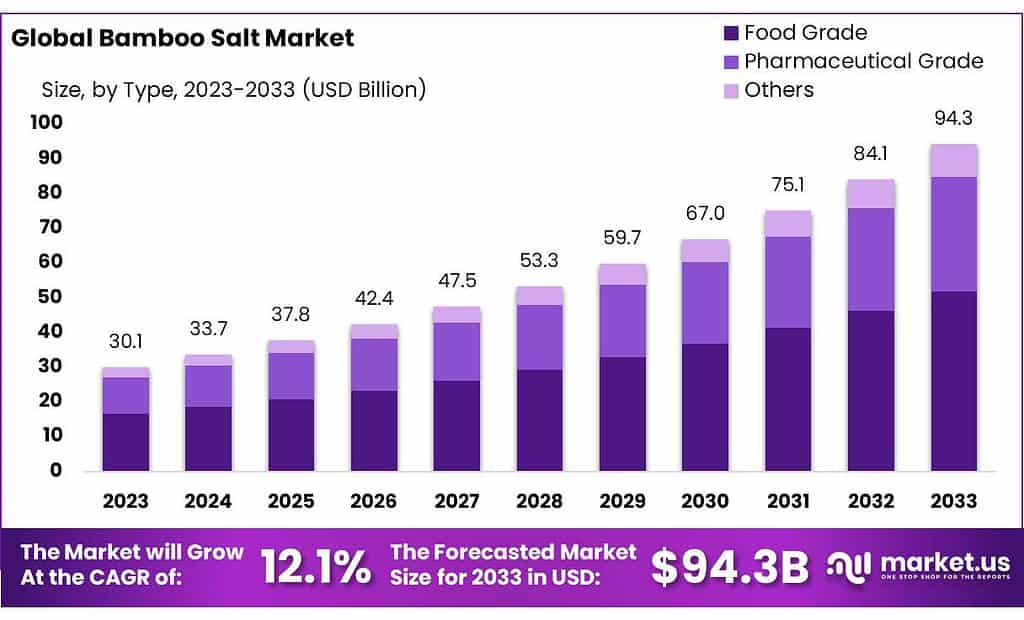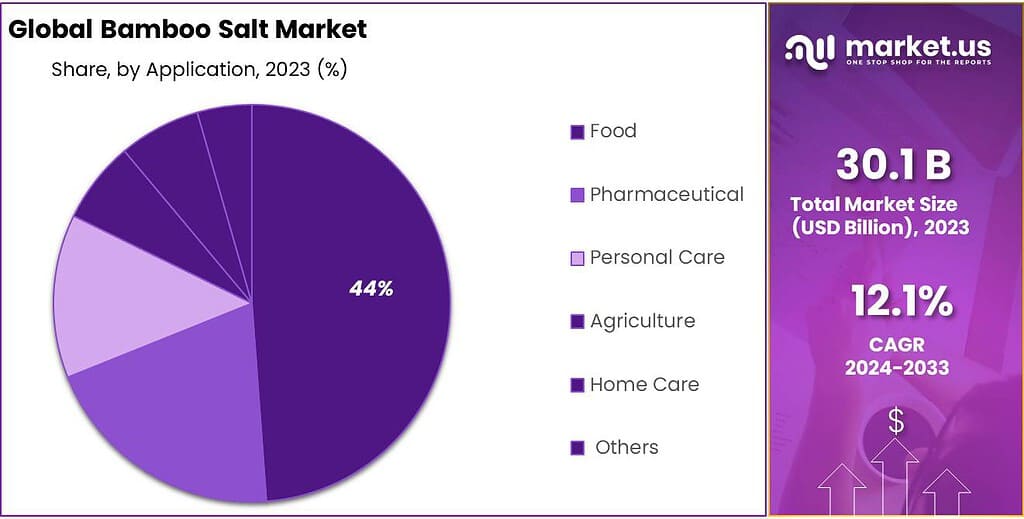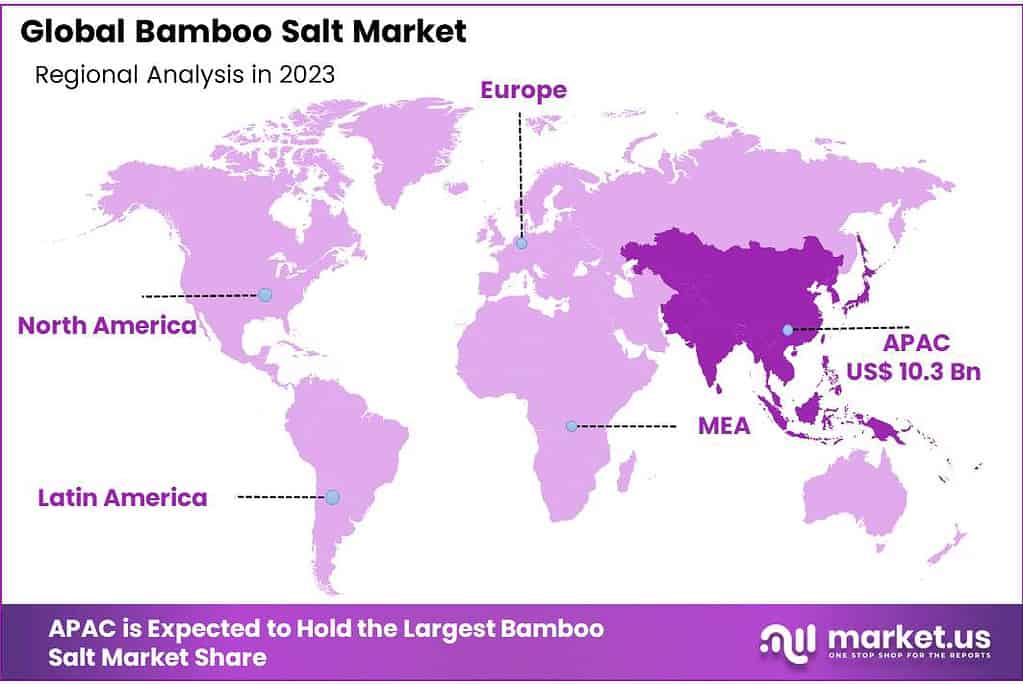Global Bamboo Salt Market By Type(Food Grade, Pharmaceutical Grade, Others), By Product Form(Powdered Bamboo Salt, Granulated Bamboo Salt, Tablet Bamboo Salt, Paste Bamboo Salt, Others), By Application(Food, Pharmaceutical, Personal Care, Agriculture, Home Care, Others), By Distribution Channel(Online, Offline) , By Region and Companies - Industry Segment Outlook, Market Assessment, Competition Scenario, Trends and Forecast 2024-2033
- Published date: Nov 2024
- Report ID: 132306
- Number of Pages: 206
- Format:
-
keyboard_arrow_up
Quick Navigation
Report Overview
The Global Bamboo Salt Market size is expected to be worth around USD 94.3 Bn by 2033, from USD 30.1 Bn in 2023, growing at a CAGR of 12.1% during the forecast period from 2024 to 2033.
Bamboo salt is a specialty product made by roasting sea salt in bamboo tubes, a process repeated multiple times—up to nine—at high temperatures. This method not only purifies the salt but also infuses it with beneficial minerals and amino acids from the bamboo. As a result, bamboo salt is gaining popularity among health-conscious consumers and gourmet chefs for its unique flavor and potential health benefits.
The bamboo salt industry is witnessing increased investment, with companies expanding their production capacities to meet rising demand. A leading South Korean company recently invested USD 2 million to upgrade its production facilities. This investment aims to boost production by 30% within the next two years, signaling confidence in the market’s growth potential.

In Europe, the bamboo salt market is expanding steadily, accounting for about 30% of the global market share in 2023. European consumers are increasingly drawn to natural products that align with their focus on health and wellness. Bamboo salt is also gaining traction in the gourmet cooking segment, where its unique flavor profile is highly valued.
The Asia Pacific region remains the dominant market for bamboo salt, holding around 55% of the global market share as of 2023. In countries like South Korea, bamboo salt has cultural significance and is widely recognized for its health benefits. This strong regional demand underscores Asia’s central role in the global bamboo salt market.
Key Takeaways
- Bamboo Salt Market size is expected to be worth around USD 94.3 Bn by 2033, from USD 30.1 Bn in 2023, growing at a CAGR of 12.1%.
- Food Grade bamboo salt held a dominant market position, capturing more than a 55.3% share.
- Powdered Bamboo Salt held a dominant market position, capturing more than a 38.1% share.
- Food application for bamboo salt held a dominant market position, capturing more than a 43.3% share.
- Offline distribution channels held a dominant market position in the bamboo salt market, capturing more than a 65.3% share.
- Asia Pacific (APAC) leading as the dominant region, holding a 34.5% market share.
By Type
By Product Form
In 2023, Powdered Bamboo Salt held a dominant market position, capturing more than a 38.1% share. This form is highly favored for its ease of use in cooking and seasoning, where it can be evenly distributed over food, offering a consistent flavor enhancement. Its fine texture also makes it ideal for blending into sauces and marinades, enhancing the absorption of the salt’s mineral-rich properties into various dishes.
Granulated Bamboo Salt follows, appreciated for its coarser texture and slower dissolution rate, which provides a crunchier feel and a burst of flavor, suitable for finishing dishes. This form is particularly popular in culinary applications where salt is a key finishing ingredient, such as in some traditional Korean dishes.
Table Bamboo Salt is pressed into larger, more regular shapes that make it convenient for use in salt shakers, catering to households and dining establishments that prefer a more traditional table salt experience with the added health benefits of bamboo salt.
Paste Bamboo Salt is utilized for its unique application in health and beauty products, such as toothpaste and skin care items, where it leverages bamboo salt’s reputed medicinal properties to enhance product efficacy.
By Application
In 2023, the Food application for bamboo salt held a dominant market position, capturing more than a 43.3% share. This segment thrives as consumers increasingly seek out healthier salt alternatives that offer additional mineral content and potential health benefits. Bamboo salt is used extensively in cooking and food preservation, where its distinct flavor and high mineral content enhance the culinary quality of a variety of dishes.
The Pharmaceutical segment also significantly utilizes bamboo salt, particularly for its supposed health benefits including dental health improvements and as an adjunct in various traditional medicine formulations. This application leverages bamboo salt’s antibacterial and anti-inflammatory properties.
In Personal Care, bamboo salt is valued for its purifying effects, used in products like toothpaste, facial cleansers, and therapeutic bath preparations, supporting skin health and hygiene by exploiting its mineral-rich and antimicrobial nature.
The Agriculture sector employs bamboo salt in a niche capacity, utilizing its properties to enhance soil fertility and plant health, reflecting an innovative approach to sustainable farming practices.
Home Care applications include bamboo salt in cleaning products due to its deodorizing and antimicrobial characteristics, providing a natural alternative to chemical-based ingredients.

By Distribution Channel
In 2023, Offline distribution channels held a dominant market position in the bamboo salt market, capturing more than a 65.3% share. This strong performance is primarily attributed to consumer preference for purchasing health-related products in-person, where they can directly assess quality and obtain immediate advice and information from health experts and sales personnel.
Traditional health stores, supermarkets, and pharmacies are key offline venues where bamboo salt is often sold, providing accessibility and reliability that many customers still favor when buying dietary and medicinal products.
Online channels are also significant but currently hold a smaller market share compared to offline. However, they are growing rapidly as consumers become more accustomed to purchasing health products online due to the convenience and often broader selection available.
E-commerce platforms and direct-to-consumer sales websites have become increasingly popular, especially among tech-savvy and younger demographics, driving up the online sales of bamboo salt and related products. The trend towards digital shopping is expected to continue, potentially altering distribution dynamics in the future as more consumers switch to online purchases for their health and wellness needs.
Key Market Segments
By Type
- Food Grade
- Pharmaceutical Grade
- Others
By Product Form
- Powdered Bamboo Salt
- Granulated Bamboo Salt
- Tablet Bamboo Salt
- Paste Bamboo Salt
- Others
By Application
- Food
- Pharmaceutical
- Personal Care
- Agriculture
- Home Care
- Others
By Distribution Channel
- Online
- Offline
Driving Factors
Health Awareness and Consumer Preferences
The rising awareness of health benefits associated with bamboo salt, such as its anti-inflammatory properties and rich mineral content, is a significant driver of its market growth. Consumers are increasingly seeking natural and health-promoting ingredients, which has elevated the demand for bamboo salt in food, pharmaceuticals, and personal care products
Cultural Significance and Traditional Use
In regions like Asia Pacific, particularly in South Korea, bamboo salt is deeply ingrained in cultural practices and traditional medicine. This historical significance combined with modern health trends continues to bolster its market presence. The established manufacturing infrastructure and extensive distribution networks in these regions facilitate the sustained growth and expansion of the bamboo salt market
Global Market Penetration through Diverse Applications
Bamboo salt’s versatility allows it to be utilized across various applications, from culinary uses as a gourmet food ingredient to therapeutic applications in healthcare products. Its adoption in gourmet and health-conscious consumer segments is particularly notable. Additionally, the expansion of e-commerce and increasing internet penetration have made bamboo salt more accessible globally, contributing to its growth in both existing and new markets
Restraining Factors
High Production Costs
The traditional production method of bamboo salt is inherently labor-intensive and time-consuming, leading to higher product costs. This process, which involves multiple roastings of sea salt packed in bamboo trunks sealed with clay, requires substantial human labor and resources, driving up the price of bamboo salt. As a result, bamboo salt can be up to four to five times more expensive than regular table salt, limiting its accessibility and affordability for a broader consumer base
Limited Consumer Awareness Outside Asia
While bamboo salt is well-known in countries like South Korea for its health benefits, consumer awareness in Western markets remains limited. This lack of familiarity can hinder market expansion, as new consumers are less likely to try or switch to bamboo salt without substantial education and marketing efforts. Addressing this challenge requires targeted educational campaigns and robust marketing strategies to increase global awareness and acceptance of bamboo salt
Regulatory and Compliance Challenges
Bamboo salt, categorized under both food and health product regulations, faces strict regulatory scrutiny, particularly in international markets. Each country’s regulatory environment can significantly affect how bamboo salt is marketed, labeled, and sold, impacting its global distribution. Compliance with these diverse regulations can be resource-intensive and complex, particularly for new market entrants or smaller producers looking to expand internationally
Growth Opportunity
Health and Wellness Trends
Increasing consumer awareness of health and wellness is significantly influencing the demand for natural and organic products, including bamboo salt. Recognized for its health benefits such as detoxification, improved digestion, and enhanced skin health, bamboo salt is becoming a popular choice among health-conscious consumers. This trend is not only promoting greater use of bamboo salt in dietary and wellness products but also spurring innovation in its applications across different sectors
Expansion into New Geographic Markets
There is considerable potential for bamboo salt in markets outside its traditional Asian base, particularly in North America and Europe, where there is a growing interest in natural and traditional health remedies. The increasing consumer preference for organic and natural products in these regions is driving the expansion of the bamboo salt market. This trend is supported by the rising penetration of online retail platforms, which are making these products more accessible to a global audience
Product Innovation and Diversification
Manufacturers are continuously innovating and diversifying the types of products available in the bamboo salt market. New product forms, such as bamboo salt toothpaste, soaps, and skincare products, are being developed. This not only attracts a broader consumer base but also opens up new channels for market penetration. By catering to a diverse range of consumer needs and preferences, bamboo salt producers are able to capture a larger share of the market and drive growth through product differentiation
Latest Trends
Health and Wellness Influence
There is a marked increase in consumer awareness about the health and wellness benefits attributed to bamboo salt. This growing awareness is significantly driving the demand for bamboo salt across various applications. Consumers are drawn to bamboo salt for its detoxification benefits, potential to improve digestion, and enhance skin health, aligning with the broader consumer shift towards natural and organic products.
Expansion in Product Applications
Bamboo salt is finding its way into a variety of new product forms such as toothpastes, soaps, and skincare products. This diversification is helping to capture a broader consumer base by appealing to daily health and personal care routines, expanding beyond traditional culinary uses.
Global Market Penetration
The market is witnessing expansion beyond its traditional Asian markets into regions like North America and Europe. This is facilitated by the rising popularity of ethnic cuisines where bamboo salt is used as a unique ingredient. Its unique flavor profile, similar to soy sauce, makes it a desirable addition in various dishes, enhancing the authenticity of Asian and fusion cuisines.
Sustainability and Eco-Friendliness
The eco-friendly production process of bamboo salt, which involves using natural elements like bamboo and clay, is resonating with global trends towards sustainable production practices. This environmentally friendly aspect is further enhancing the appeal of bamboo salt among environmentally conscious consumers
Regional Analysis
The Bamboo Salt market showcases diverse regional dynamics, with Asia Pacific (APAC) leading as the dominant region, holding a 34.5% market share and generating revenues of approximately USD 10.3 billion.
This dominance is largely attributed to the deep cultural roots and traditional usage of bamboo salt in countries like South Korea, where it is widely used in both culinary and medicinal practices. The region benefits from established manufacturing processes and extensive distribution networks that support both domestic consumption and international exports.
In North America, the market is experiencing growth due to increasing consumer awareness of health benefits associated with natural and organic products. The U.S. and Canada are seeing a rising demand for bamboo salt in health food stores and online platforms, where consumers are drawn to its unique health benefits and culinary applications.
Europe’s market is growing steadily, driven by a growing interest in exotic and gourmet salts among health-conscious consumers. Countries like Germany, the UK, and France are leading this trend, integrating bamboo salt into health and wellness products.
The Middle East & Africa and Latin America regions are relatively smaller markets for bamboo salt but are expected to grow. In these regions, the focus is on expanding the consumer base by educating about the health benefits of bamboo salt through health workshops and online marketing campaigns.

Key Regions and Countries
- North America
- US
- Canada
- Europe
- Germany
- France
- The UK
- Spain
- Italy
- Rest of Europe
- Asia Pacific
- China
- Japan
- South Korea
- India
- Australia
- Rest of APAC
- Latin America
- Brazil
- Mexico
- Rest of Latin America
- Middle East & Africa
- South Africa
- Saudi Arabia
- UAE
- Rest of MEA
Key Players Analysis
The bamboo salt market features a diverse group of key players who are instrumental in driving its growth and innovation. Among them, Insan Bamboo Salt and Korean Bamboo Salt are prominent, known for their traditional methods of producing bamboo salt which involve roasting sea salt in bamboo cylinders sealed with yellow clay. These companies leverage their deep-rooted heritage in South Korean traditional medicine and cuisine to produce high-quality bamboo salt that is used both domestically and internationally.
Dabyut Food and ZhejiangLin’an Sanheyuan bamboo-salt food Co., Ltd are also significant contributors to the market. These companies focus on the mass production and distribution of bamboo salt, catering to the growing demand for health-centric products in global markets. They utilize advanced technology to enhance production efficiency while maintaining the unique properties of bamboo salt.
HK3 Marketing Sdn. Bhd., INSAN, and Insanhealing specialize in integrating bamboo salt into various health and wellness products, expanding its applications beyond traditional uses. These companies innovate in product development, ranging from dietary supplements to personal care items, thus broadening the market reach of bamboo salt. The strategic marketing and distribution channels established by these firms help in tapping into new market segments, particularly in regions where natural and organic products are highly valued.
Top Key Players in the Market
- Dabyut Food
- HK3 Marketing Sdn. Bhd.
- INSAN
- Insan Bamboo Salt
- Insanhealing
- Korea Salt
- Korean Bamboo Salt
- OCKSUJUNG BAMBOO SALT
- Yibin Fengyuan Salt Co. Ltd.
- ZhejiangLin’an Sanheyuan bamboo-salt food Co.,Ltd
- Dabyut Food
Recent Developments
In 2023, Dabyut Food expanded its production capacity by 15% to meet the increasing global demand for natural and organic products.
In 2024 HK3 Marketing Sdn. Bhd, company plans to invest USD 500,000 in research and development to further innovate its product offerings and enhance market competitiveness.
Report Scope
Report Features Description Market Value (2023) USD 30.1 Bn Forecast Revenue (2033) USD 94.3 Bn CAGR (2024-2033) 12.1% Base Year for Estimation 2023 Historic Period 2019-2022 Forecast Period 2024-2033 Report Coverage Revenue Forecast, Market Dynamics, Competitive Landscape, Recent Developments Segments Covered By Type(Food Grade, Pharmaceutical Grade, Others), By Product Form(Powdered Bamboo Salt, Granulated Bamboo Salt, Tablet Bamboo Salt, Paste Bamboo Salt, Others), By Application(Food, Pharmaceutical, Personal Care, Agriculture, Home Care, Others), By Distribution Channel(Online, Offline) Regional Analysis North America – US, Canada; Europe – Germany, France, The UK, Spain, Italy, Rest of Europe; Asia Pacific – China, Japan, South Korea, India, Australia, Singapore, Rest of APAC; Latin America – Brazil, Mexico, Rest of Latin America; Middle East & Africa – South Africa, Saudi Arabia, UAE, Rest of MEA Competitive Landscape Dabyut Food, HK3 Marketing Sdn. Bhd., INSAN, Insan Bamboo Salt, Insanhealing, Korea Salt, Korean Bamboo Salt, OCKSUJUNG BAMBOO SALT, Yibin Fengyuan Salt Co. Ltd., ZhejiangLin’an Sanheyuan bamboo-salt food Co.,Ltd, Dabyut Food Customization Scope Customization for segments, region/country-level will be provided. Moreover, additional customization can be done based on the requirements. Purchase Options We have three licenses to opt for: Single User License, Multi-User License (Up to 5 Users), Corporate Use License (Unlimited User and Printable PDF) 
-
-
- Dabyut Food
- HK3 Marketing Sdn. Bhd.
- INSAN
- Insan Bamboo Salt
- Insanhealing
- Korea Salt
- Korean Bamboo Salt
- OCKSUJUNG BAMBOO SALT
- Yibin Fengyuan Salt Co. Ltd.
- ZhejiangLin'an Sanheyuan bamboo-salt food Co.,Ltd
- Dabyut Food










